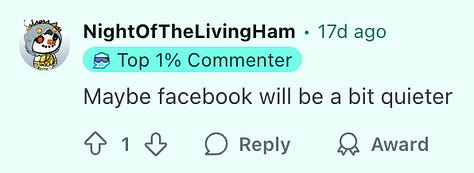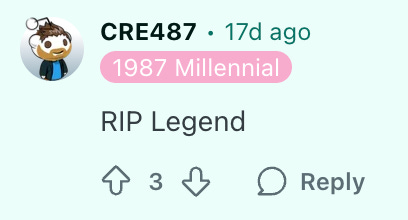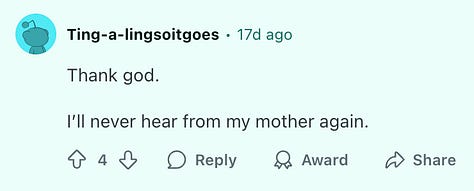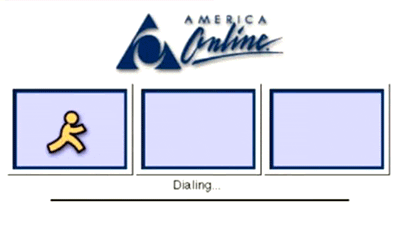Obituary for dial-up internet
I learned what dial-up internet is (was) yesterday
Yesterday, I was told there once was a time where you couldn’t call someone and use the internet at the same time. *Dial-up internet* is what they called it. When I played the jingle out loud in a coffee shop (accidentally), I felt a scattered wave of winces, like a frequency that only older folks could hear.
Earlier this month, AOL announced (they left a note on their website) that they’re discontinuing dial-up internet on September 30th. The decision surprised many —dial-up was still around? If no one uses dial-up internet anymore, is it really being discontinued?1 If a tree falls in a forrest, does it make a sound?
Being chronically online, the mere premise of a Spectrum outage makes me want to gouge my eyes out (this neo-luddite blog is my path to recovery, I’m not quite there yet). But having to get out of bed, kick your hormonal sibling off the phone, punch in some numbers just to maybe download half a song seems excessive. I’ll be brave and say that I’d rather go for a run than endure slow internet.
Alas.
R.I.P. Dial-up Internet, (1989-2025).
Remembered for her persistent, high-pitched screech, Dial-up was a loving partner and a dear friend. She brought us AOL Chatrooms, GeoCities, Napster. She was the midwife of many firsts: dating profiles, DMs, sneaky links. Her tenacity made way for the generational impact of LOL, not to mention the sensual tease of seeing a digi-cam thirst trap load line-by-line.
Against all odds, she survived a long battle with broadband only to be met with the fate of corporate budget cuts. Her legacy lives on in Wi-Fi and TikTok-speak. Let us remember her, not for the fights she started with your mother, but the connection she brought all of us.
The sound of the dial-up modem defined the 90s.
Weezer, Gorillaz, Soulja Boy, Blink-182 all sampled the sound in their music. Listening to it from start to finish, uninterrupted, was the ritual everyone performed to get on the internet. It was the sound you had to hear before you could text your friends, (illegally) download NSYNC’s newest release, or respond to the world’s first-ever breakup text. Each part of the jingle meant something. Just as every interaction it facilitated felt consequential.2 This short tune —not unlike the sweet ping of a slack notification— undoubtedly summons a Pavlovian shiver down many spines.
Potentially blasphemous take, it gave me the same energy as Apple’s power on chime.3
Constellations had to align for anyone in the 90s to conjure the internet.
Imagine internet trolls painstakingly arguing with their equally online roommates just to leave a comment on a conspiracy subreddit. Imagine if Elon had to wait a full 3 minutes before publishing a tweet that Grok almost instantaneously fact checks (using the term ‘publishing’ here feels profane). The world would be a better place, just by process of elimination.
Dial-up’s signature screech was a also rite of passage. It transformed people. It created a minute’s worth of liminal space for you to decide who you wanted to be online that day. At the very least, it made the average American think using “roftlmao” was cool.



The OG parental control
It also occurred to me that all parents had to do then was pull the plug on what absolutely was the most consequential conversation you’ll ever have with your secret high school boyfriend. Feel the burden to casually track locations and devise hard-to-crack screen-time passcodes melt away. It was so much easier to keep us delinquents in line back then. Oh… the youths.
This is all to say that, while I can’t claim the nostalgia that dial-up seems to carry, I find its premise quite romantic. Did the idiosyncrasies of this prehistoric practice actually protect the internet from what it’s become today? Were we better people when we had an extra minute or so to decide who we wanted to be online?
Neil Postman did once caution that society’s decline comes when we lose our “tolerance for delayed responses.”
Yes, I’m well aware there’s a millennial somewhere reading this and viscerally rolling their eyes. Someone even made a server emulator for old AOL clients. Bring it back!
According to the U.S. Census, an estimated 163,000 households in the United States were using only dial-up for internet service as of 2023.
Someone broke down what every part of the dial-up sound meant
Here’s a complete collection of Apple’s chimes from 1980-2022, just in case you were curious.






I remember when we finally got dial-up internet! The cd-rom disks from aol… the anticipation as it connected… the chat rooms… fun fact: my IG handle is my old aol username ☺️
'older folks' 😭